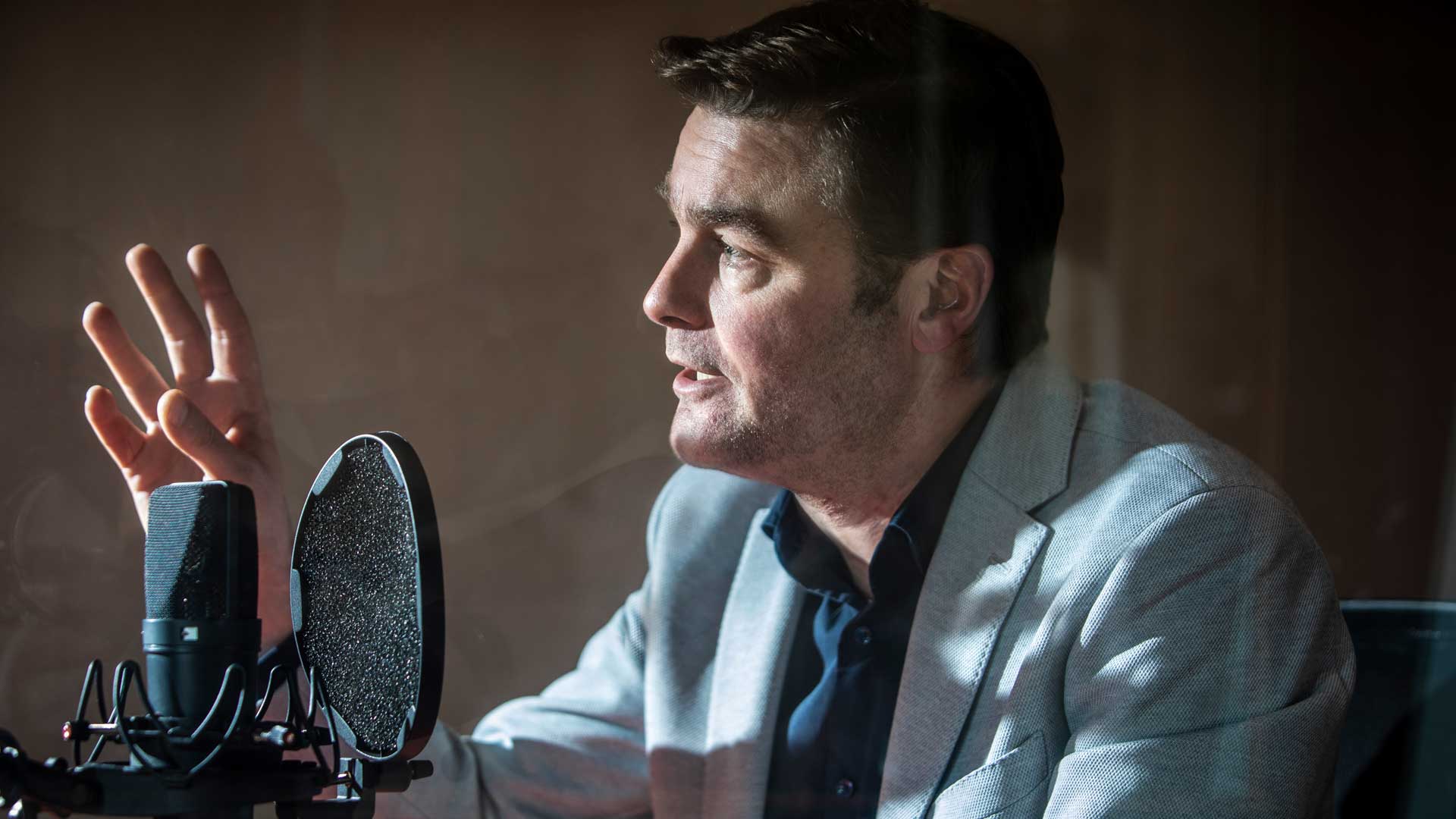Key Points
- Baillie Gifford's Global Discovery Team focuses on immature companies with big potential
- These companies are often shaping the evolution of their industries and addressing society's problems
- Despite periods of adversity, the Global Discovery Team is optimistic about the enduring scale of opportunity

All investment strategies have the potential for profit and loss, your or your clients’ capital may be at risk.
Reflecting on three extraordinary years
There has never been a period like 2020–2023. First a global lockdown, then a difficult reopening, set against an increasingly troubled geopolitical backdrop. Volatility in global markets reflected the instability and uncertainty of the times.
Whatever the backdrop, Global Discovery looks for a special subset of companies: those at an early stage with the potential to disrupt their industries. As a high-growth style applied to the most innovative part of the market, it’s not an approach we can easily change when volatility strikes. Nor would we want to.
It has made for a bruising few years, but the experience has brought us even closer together as a team and galvanised elements of our philosophy and process.
As markets gyrated around us, we chose to stand firm. While sticking to our knitting, we challenged ourselves even harder on why we want to own a particular company. And we kept faith with our ‘four traits’ framework: looking for innovation against unmet problems, competitive advantage, quality of management and intrinsic scalability.
When reflecting on periods of upheaval, it’s natural to consider lessons for the future. But investment managers should be careful not to set in stone ‘learnings’ from one set of circumstances. The opposite might hold true next time. Rather than rethinking our entire philosophy and process, we’re using our experience to get better at company analysis.
For example? We’re more attuned than ever to the importance of robust unit economics – how much a business earns per unit or product, less the cost of production. When cash was abundant, many companies didn’t worry about the sustainability of how they were operating.
Not anymore. We’ve always looked for companies with favourable unit economics, avoiding those that lacked them, we now hope this positioning will be rewarded. Likewise, we’ve reflected on the distorting effects of periods of super-normal demand and thought more about how to better establish a more natural growth rate.
As long-term growth investors, looking lower down the market-cap spectrum, there will inevitably be times where the market is against us. But we won’t be out of sync forever. Either the market sentiment will shift, or the progress of our portfolio companies will force a rethink of their worth. Watching and interacting with our companies makes us consider the latter more likely.

A universe of opportunity ahead
Does the end of an era of cheap money pose an existential threat to the strategy? The question has been asked because the funding of early-stage businesses has changed: decision makers now have a higher threshold for committing to deploy capital. But this doesn’t undermine the strategy or meaningfully diminish the future opportunity.
The Global Discovery strategy wasn’t predicated on a view of interest rates or companies’ funding cycles, and it doesn’t rely on them. It’s likely that we’re moving from almost a decade of abundance to a period of scarcity, whether in supply chains, funding or investor tolerance of uncertainty.
After a rising tide lifted a lot of boats, the next phase will be more demanding. This will increase demands on the companies in which we invest, but we shouldn’t be deterred or cowed.
Yes, this new environment will split the wheat from the chaff, but that plays to our skill in determining which companies have a real edge and are developing efficiency-boosting tools for the new environment. Our basic function as stock-pickers – finding the special investment opportunities – looks more challenging. That makes our skills and experience all the more valuable.
We continue to think ambitious companies will ultimately be rewarded, regardless of the funding environment. Capital tends to find its way to the firms with the best answers to society’s problems. But with the stock market currently preferring near-term resilience to long-term relevance, businesses on that longer trajectory must show more robustness.
Increasingly they will need the funding and balance sheet strength to fulfil their promise over many years. Therefore, we now look for companies to show skill at capital allocation.
We don’t mean companies should be gun-shy about investing, but the marginal dollar should be applied to their core competency. We always look at which technologies companies target with their marginal research and development funds. In the tech world, demand for investment is commonly insatiable. The mantra being that if you stand still, you move backwards. Yet, if something isn’t within a company’s core competency, it’s now best for them to recognise that and, through outsourcing or partnerships, make sure they’re maximising return on investment.
While Global Discovery’s interest in promising early-stage companies is well-known, it’s worth stressing our equal desire still to be owning these problem-solving, innovative companies when they come to deliver.
The portfolio contains a wide spectrum of company maturities, including some we’ve owned for 10 years or more which have largely de-risked their core products and solutions. There’s still significant potential, however, for these businesses to run further, which is why companies such as Alnylam and Axon Enterprise, and emerging incumbents such as MarketAxess remain as significant positions in the portfolio. These aren’t staid old companies that have been around for decades, but companies now becoming dominant franchises in areas of enduring structural opportunity.
That’s what excites us. We ask how these companies can use their emerging incumbency, and associated financial strength, to turbocharge growth and deepen competitive advantage in a new period of relative belt-tightening.
Scarcity may increase the appeal of many holdings. We look for companies whose solutions are both better and cheaper than the status quo. A handful of software holdings are helping businesses do more with less, driving productivity.
Blackline’s cloud accounting software allows financial managers to automate and streamline record-keeping and make informed decisions more easily. Appian’s code library can be bolted on to companies’ systems to build bespoke applications, automating time-consuming processes. The added value offered far outstrips their relatively small subscription fees. These propositions become more compelling when everyone is focussed on cost.
Global Discovery was founded on the assumption that smaller businesses can now access technologies and capabilities that allow them to scale and globalise where they once would have struggled. Financial conditions may have tightened, but we assert that this structural opportunity is as viable as ever. Smaller, more innovative companies are being empowered by a long cycle of technological change, propelled by human ingenuity and inquisitive entrepreneurship.
The history of civilisation has been one of technologies, from the printing press to semiconductors and battery storage, becoming more affordable and widespread. This improves access and makes failure less daunting – both important prerequisites for progressive innovation, continuing the pattern.
These powerful exponential trends: increased capabilities and falling costs, have progressed undeterred through crisis after crisis, whether the dotcom bubble or the 2008 global financial meltdown. Now, if anything, that progress seems to be accelerating.
Exponential trends in technology are opening new frontiers for innovation
Source: National Human Genome Research Institute, Lafond, F. et al (2017). Ziegler, M. & Trancik, J. (2021). McCallum, J. Moore, G.; The Linley Group; Nielsen Norman Group; The Economist. Data 2000 to 2021.
The nature of this trend is to compound over time. As we become more connected, it’s easier to access and share information and collaborate with all the new tools and technologies. Machine learning algorithms and generative AI shorten the gap between these leaps. Technologies are becoming as accessible to small companies as they are to big companies.
Besides benefitting from the reductions in unit costs of key enabling technologies, some of our companies are contributing to those reductions.
Oxford Nanopore’s low cost sequencing technology, which can interrogate DNA with unprecedented precision, is positioned to transform the application of genomics in both scientific research and clinical decision-making.
SpaceX, owned as a private company in a UK investment trust we manage, is well known now but when we first invested, it was much more doubtful that you could launch thousands of satellites to provide broadband access practically everywhere. It’s delivering attractive returns while slashing the cost of access to these technologies and driving a massively deflationary trend.

SpaceX Starship launch. © SpaceX
Rather than fixating on any singular trend, be they based on Moore’s law or its genomic equivalent the Carlson Curve, we watch how such developments interact.
The most interesting businesses are those with their finger on the pulse of multiple technologies who are integrating them in ways others struggle to replicate. The root of their competitive edge is the convergence of technologies and the interdisciplinary skills they amass.
To cite Oxford Nanopore again, its edge over competitors is made up of expertise in numerous distinct domains: semiconductors, protein biochemistry, sensor technology and machine learning algorithms to interpret the signal. That combination is hard to replicate.
Alternatively, consider Axon Enterprise, which combines expertise in vision sensors and AI to accelerate evidence collection and analysis. Or Ocado, which is using robotics and machine learning expertise to bring down prices in logistics and formerly labour-intensive fulfilment centres.
More surprising is that, even as a team that monitors the expanding frontiers of innovation, we’re still coming across companies doing things that even a few years ago we wouldn’t have thought possible.
US drug discovery software company Schrodinger is a good example here. The idea that a computer could design a drug from scratch would once have seemed preposterous, given the intricacies of how drugs work within the body and the number of variables involved. Schrodinger has effectively decoded the rules of molecular physics by harnessing modern computational power.
Advances such as this attest to the constant refreshing of Discovery’s opportunity set. We never feel we’re running out of opportunity to invest in companies shaping the future.

Ocado bots at work in Andover, Hampshire. © Peter Nicholls/REUTERS
Why now?
There are two answers to this question. One concerns our view on current valuations, the other is based on our enduring rational optimism about technology-driven innovators and companies.
There’s no doubt our part of the market has been hard hit by recent price falls. We’re long-term growth investors, so we would never trade on our ability to time markets. We’ve always seen the tremendous potential for upside in these immature businesses, but it does currently seem that investors with the right horizons could see these benefits accentuated.
We’re more confident than ever in the structural opportunity – and that it remains timeless. Despite market concern about macroeconomics and geopolitics, our long-term philosophy has never been more relevant.
Yes, there are reasons for angst, but there always will be. More importantly, there will always be a plethora of problems to be solved, and innovators with the ingenuity to tackle them, using tools that are improving exponentially. That’s the real opportunity Discovery looks to exploit. It’s a recipe for long-term value creation.
Perhaps another way to view Global Discovery is as your hedge against disruption. Some of the companies we own operate with grand designs but are as yet unproven. We’re ready to tolerate – and embrace – such businesses early in their lifecycle.
We do so because that’s what we’re here to do: look at cutting-edge technology and experiment. Some of these businesses might be carving out the new industrial landscape of the coming decades. We should look beyond the here and now and focus on the ‘risk’ of things going really well for these pioneering companies.
While doom and gloom will always be with us, looking back over the long term, innovation and progress have tended to surprise more on the upside. That’s what the great Swedish statistician Hans Rosling, who backed his optimism with hard data, described as ‘the secret silent miracle of human progress’.
The current consensus seems to assume that progress has come to a halt. We think that’s profoundly wrong.
Periods of adversity like the last three years make it especially important that investors aren’t tempted to fall for it.
The Global Discovery Team
Risks and additional information
The views expressed should not be considered as advice or a recommendation to buy, sell or hold a particular investment. They reflect opinion and should not be taken as statements of fact, nor should any reliance be placed on them when making investment decisions.
This communication was produced and approved in June 2023 and has not been updated subsequently. It represents views held at the time of writing and may not reflect current thinking.
Potential for profit and loss
All investment strategies have the potential for profit and loss, your or your clients’ capital may be at risk. Past performance is not a guide to future returns.
This communication contains information on investments which does not constitute independent research. Accordingly, it is not subject to the protections afforded to independent research, but is classified as advertising under Art 68 of the Financial Services Act (‘FinSA’) and Baillie Gifford and its staff may have dealt in the investments concerned.
All information is sourced from Baillie Gifford & Co and is current unless otherwise stated.
The images used in this communication are for illustrative purposes only.
Important information
Baillie Gifford & Co and Baillie Gifford & Co Limited are authorised and regulated by the Financial Conduct Authority (FCA). Baillie Gifford & Co Limited is an Authorised Corporate Director of OEICs.
Baillie Gifford Overseas Limited provides investment management and advisory services to non-UK Professional/Institutional clients only. Baillie Gifford Overseas Limited is wholly owned by Baillie Gifford & Co. Baillie Gifford & Co and Baillie Gifford Overseas Limited are authorised and regulated by the FCA in the UK.
Persons resident or domiciled outside the UK should consult with their professional advisers as to whether they require any governmental or other consents in order to enable them to invest, and with their tax advisers for advice relevant to their own particular circumstances.
Financial intermediaries
This communication is suitable for use of financial intermediaries. Financial intermediaries are solely responsible for any further distribution and Baillie Gifford takes no responsibility for the reliance on this document by any other person who did not receive this document directly from Baillie Gifford.
Europe
Baillie Gifford Investment Management (Europe) Limited provides investment management and advisory services to European (excluding UK) clients. It was incorporated in Ireland in May 2018. Baillie Gifford Investment Management (Europe) Limited is authorised by the Central Bank of Ireland as an AIFM under the AIFM Regulations and as a UCITS management company under the UCITS Regulation. Baillie Gifford Investment Management (Europe) Limited is also authorised in accordance with Regulation 7 of the AIFM Regulations, to provide management of portfolios of investments, including Individual Portfolio Management (‘IPM’) and Non-Core Services. Baillie Gifford Investment Management (Europe) Limited has been appointed as UCITS management company to the following UCITS umbrella company; Baillie Gifford Worldwide Funds plc. Through passporting it has established Baillie Gifford Investment Management (Europe) Limited (Frankfurt Branch) to market its investment management and advisory services and distribute Baillie Gifford Worldwide Funds plc in Germany. Similarly, it has established Baillie Gifford Investment Management (Europe) Limited (Amsterdam Branch) to market its investment management and advisory services and distribute Baillie Gifford Worldwide Funds plc in The Netherlands. Baillie Gifford Investment Management (Europe) Limited also has a representative office in Zurich, Switzerland pursuant to Art. 58 of the Federal Act on Financial Institutions (‘FinIA’). The representative office is authorised by the Swiss Financial Market Supervisory Authority (FINMA). The representative office does not constitute a branch and therefore does not have authority to commit Baillie Gifford Investment Management (Europe) Limited. Baillie Gifford Investment Management (Europe) Limited is a wholly owned subsidiary of Baillie Gifford Overseas Limited, which is wholly owned by Baillie Gifford & Co. Baillie Gifford Overseas Limited and Baillie Gifford & Co are authorised and regulated in the UK by the Financial Conduct Authority.
Hong Kong
Baillie Gifford Asia (Hong Kong) Limited 柏基亞洲(香港)有限公司 is wholly owned by Baillie Gifford Overseas Limited and holds a Type 1 and a Type 2 license from the Securities & Futures Commission of Hong Kong to market and distribute Baillie Gifford’s range of collective investment schemes to professional investors in Hong Kong. Baillie Gifford Asia (Hong Kong) Limited 柏基亞洲(香港)有限公司 can be contacted at Suites 2713–2715, Two International Finance Centre, 8 Finance Street, Central, Hong Kong. Telephone +852 3756 5700.
South Korea
Baillie Gifford Overseas Limited is licensed with the Financial Services Commission in South Korea as a cross border Discretionary Investment Manager and Non-discretionary Investment Adviser.
Japan
Mitsubishi UFJ Baillie Gifford Asset Management Limited (‘MUBGAM’) is a joint venture company between Mitsubishi UFJ Trust & Banking Corporation and Baillie Gifford Overseas Limited. MUBGAM is authorised and regulated by the Financial Conduct Authority.
Australia
Baillie Gifford Overseas Limited (ARBN 118 567 178) is registered as a foreign company under the Corporations Act 2001 (Cth) and holds Foreign Australian Financial Services Licence No 528911. This material is provided to you on the basis that you are a ‘wholesale client’ within the meaning of section 761G of the Corporations Act 2001 (Cth) (‘Corporations Act’). Please advise Baillie Gifford Overseas Limited immediately if you are not a wholesale client. In no circumstances may this material be made available to a ‘retail client’ within the meaning of section 761G of the Corporations Act.
This material contains general information only. It does not take into account any person’s objectives, financial situation or needs.
South Africa
Baillie Gifford Overseas Limited is registered as a Foreign Financial Services Provider with the Financial Sector Conduct Authority in South Africa.
North America
Baillie Gifford International LLC is wholly owned by Baillie Gifford Overseas Limited; it was formed in Delaware in 2005 and is registered with the SEC. It is the legal entity through which Baillie Gifford Overseas Limited provides client service and marketing functions in North America. Baillie Gifford Overseas Limited is registered with the SEC in the United States of America.
The Manager is not resident in Canada, its head office and principal place of business is in Edinburgh, Scotland. Baillie Gifford Overseas Limited is regulated in Canada as a portfolio manager and exempt market dealer with the Ontario Securities Commission (‘OSC’). Its portfolio manager licence is currently passported into Alberta, Quebec, Saskatchewan, Manitoba and Newfoundland & Labrador whereas the exempt market dealer licence is passported across all Canadian provinces and territories. Baillie Gifford International LLC is regulated by the OSC as an exempt market and its licence is passported across all Canadian provinces and territories. Baillie Gifford Investment Management (Europe) Limited (‘BGE’) relies on the International Investment Fund Manager Exemption in the provinces of Ontario and Quebec.
Israel
Baillie Gifford Overseas is not licensed under Israel’s Regulation of Investment Advising, Investment Marketing and Portfolio Management Law, 5755–1995 (the Advice Law) and does not carry insurance pursuant to the Advice Law. This material is only intended for those categories of Israeli residents who are qualified clients listed on the First Addendum to the Advice Law.
Ref: 46500 10020974




